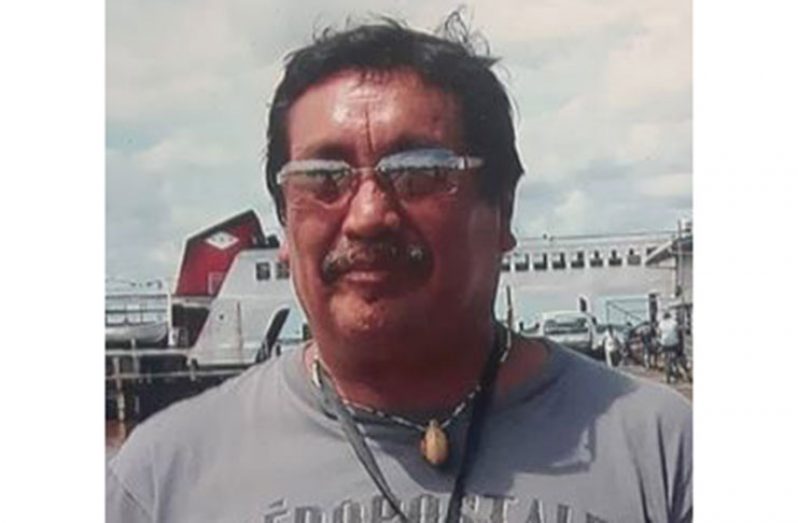MINISTER of Amerindian Affairs Pauline Sukhai and staff of the ministry have extended their sincere condolences to the family and friends of former Paramakotoi Toshao Matheson Williams, who died on Sunday evening.
Williams was also a Community Development Officer (CDO) attached to the Ministry and a former Member of Parliament (MP).
Born in August 1956, Williams was one of the first children in the community to go to school. His family members were humble but progressive, and collectively were among the earliest to petition the then Interior Governor Robinson Williams to build a school in the emerging community.
The young Williams, who had no knowledge of the English Language during that time, attended the Pilgrim Holiness School which was rn by the church. There, he was beaten for being absent or late. Although he initially struggled, he was still one of four chosen to write the community’s inaugural Common Entrance examination.
The complete failure of the four students did not deter Matheson; instead, it aroused a desire for knowledge and education and an awareness of the vast disparity of learning opportunities for children in indigenous communities.
His quest to control his fate and destiny propelled him to become a lifelong book reader.
After secondary studies, Williams applied to the Guyana School of Agriculture but was drafted into a para-military organisation, the Guyana Youth Corps, where he served for one year before it was absorbed the Guyana National Service and learnt several trades.
Still pursuing his education, he then started classes at the Burrowes School of Art, while working at the Materials Production Unit as a graphic artist.
Financial difficulties forced him to quit his studies and soon he returned home, where he met and later married his wife, who eventually bore him four children.
As a married man, Matheson settled into a more structured lifestyle and soon he became integrally involved in the council. Many times he left his wife and children for days while doing voluntary work.
Matheson had impressed then headmaster of the Paramakatoi Community School, Stanley Singh, and he was awarded a position at the school to teach first-year students. However, that job was short-lived.
Political life
At the age of 35, Matheson embarked on a quest that led him into the national political arena.
At that time, the sub-region was cut off from the rest of the region and the capital. The airstrip in the village was closed, malaria was rampant and there was a serious food shortage.
It was then that Williams and Toshao Peberty Kemfune decided to do all in their power to make a change. They were initially going to walk to Georgetown, but were helped partially along the way. It still took them a week to reach the city. At first, it was difficult for them to get assistance, but Eusi Kwayana and other members of the Working People’s Alliance (WPA) came to their assistance.
Soon Williams began campaigning for the WPA leading up to the 1992 general and regional elections.
In 1993, as an MP he tabled a motion in Parliament with the assistance of the WPA to repeal the Amerindian Act (29:01), which was unanimously passed by the House and became law 13 years later in 2006 under then Minister Carolyn Rodrigues.
Having the motion passed was the highpoint of Williams’s national political career.
Community service
Although Williams left national politics, he was still integrally involved at the local level, but after serving on the Regional Democratic Council, he returned home to serve, first as an acting toshao before he was elected toshao. During his stint as toshao, he was elected as vice-chairman of the Area Council.
During this time he and his fellow toshaos created history when they decided to protest against the government to amend the Kaieteur National Park Act, which they felt was counterproductive to the indigenous way of life.
Williams was tasked with presenting the toshaos’ case to Prince Charles who was visiting the area. He had to manoeuvre around police restrictions to seek an audience with the prince. When he did, it was impactful, since the BBC broadcasted the toshaos’ concerns all over the world, which forced an amendment to the Act. Although it was not in line with what the natives wanted, it was better than before.
Even though Williams played his part he had opposition and at one time they managed to turn a number of villagers against him by peddling the notion that he had sold land in the area.
Despite the negativity, Williams continued to serve in his position and was able to re-open and improve the airstrip and secure a tractor, among several other significant ventures.
With persons still opposing him despite his efforts to develop the community, Williams resigned from his post in February 2000. He then decided to take up the post of Community Development Officer with the then Ministry of Amerindian Affairs. He continued to serve in that capacity, even though he had lost a child in an accident in 2010, which resulted in him falling ill.
Although he has worked alongside several ministers and toshaos, Williams’s top priority was always the development of his community and the upward mobility of its people.


.jpg)











